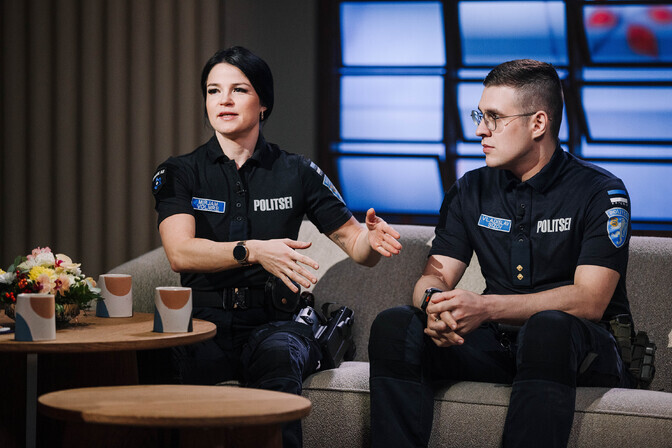Patrol officers Mirjam Volmre and Vladislav Sizov said on “Hommik Anuga” that police calls often reveal the harsh conditions many Estonians live in.
Mirjam Volmre, a group leader in the patrol unit of the Ida-Harju police station in the PPA’s North Prefecture, has worked as a patrol officer for nearly 12 years. Her patrol partner, Vladislav Sizov, has been on the force a little over three years.
For Volmre, being a patrol officer is first and foremost a calling. While no two days are alike, she always heads to work in good spirits and genuinely enjoys what she does.
“It’s a varied job, it keeps me on my toes. I don’t go to work thinking, ‘When will this shift be over?’ I do it with heart,” she said.
In their line of work, patrol officers regularly encounter difficult situations and poor living conditions. “We see the full picture of how people actually live,” Sizov noted.
Volmre agreed, saying the scenes they encounter during calls can be heartbreaking.
“Just recently, we went to an apartment where the smell when we walked in was so overwhelming it made your stomach turn. And there was this poor person sitting on the bed, having soiled themselves. That’s when we take photos, make a report and notify the district, because a social worker needs to be involved,” she explained.
The officers stressed that a large share of calls are alcohol-related. Drug use and mental health issues are also often at the root of the problem.
There are many cases that have left a lasting emotional impact on Volmre and Sizov. Volmre recalled a domestic violence call where a young girl reported abuse by her parents.
“The daughter said her mother or father had beaten her with a belt — she had visible injuries that we had to deal with. And when we asked where the child, she was about 12, should go, she said, ‘Please take me to Grandma’s — she doesn’t hit me as hard.’ That’s the kind of moment where you feel a flood of emotions. In that case, I believe we took her to a shelter instead, because we obviously can’t send her somewhere where the violence is just less severe,” Volmre recalled.
Sizov also remembered a particularly painful case involving a child. “There was a verbal argument between a mother and her child that escalated into physical violence and the child died. We responded to the scene and what really stuck with me was seeing the child’s toys and drawings in the apartment. That hit hard.”
After such difficult calls, it’s important to share emotions with people you can talk to.
“When the case with the child happened — the one Vlad described — I called the guys out to the yard after the call. We sat down and I asked how they were feeling and whether they wanted to talk about it. Since I had the background and they had been on the scene and seen the child, the home, the environment, it was something we could talk through together. And sometimes, that makes it a bit easier,” said Volmre, who was the field supervisor involved in the incident.
Sometimes, coping means finding other ways to let emotions out. “It’s a 40-kilometer drive home and sometimes I just cry. I cry the pain and emotion out, think things through and then I go home,” Volmre added.
Speaking about their relationship, the partners said they are always there for each other.
“We have a ten-year age gap, but I’m like his big sister — I actually call myself that. We support each other, we show up for each other. Vlad has babysat my kids and I know he’ll help again if I ever need him to,” Volmre said.
—
